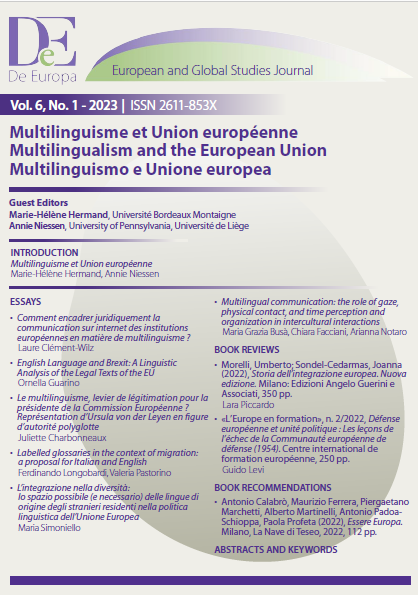English Language and European Union: A Corpus-Based Study of EU Secondary Legislation
DOI:
https://doi.org/10.13135/2611-853X/7140Abstract
To this date, English is one of the working languages of the EU and, most importantly, it is the ‘de facto’ lingua franca of the EU, as the source language of most European documents is mainly English (Crystal 2017). Despite Brexit, English remains the most studied language in Europe (Kużelewska 2020), not to mention the fact that it is the language of globalization. However, the UK’s exit from the EU prompts the question as to what will be the development of English in the post-Brexit landscape.
In light of this, the present article aims at conducting a linguistic analysis of Euro-English in order to assess if and how such type of English differs from the Standard English (SE). If yes, is it possible that the Brexit phenomenon will contribute even further to the consolidation of a new variety of English in its own terms? There is an ongoing debate on this issue, which is perhaps more topical today than ever before.
The purpose of this article is therefore to analyze the current status of the English language used in EU legislation. In order to do so, this article provides a brief introduction of the linguistic landscape of the EU, by assessing the historical process of multilingualism and the EU egalitarian language policy. Subsequently, the article goes on to the analysis of a corpus of EU legislation (Directives, Regulations, Decisions, Recommendations, Opinions) drawn up in English in the last decades (1992-2022) to assess whether Euro-English has specific linguistic features at the lexical, morphosyntactic, and textual levels. The selected corpus of EU legal texts is compared to a corpus of UK legislation elaborated during the same time frame and the data are processed using the WordSmith Tools 8.0 software.
Keywords: English Language; Euro-English; Brexit; Legal Discourse; Legislative Drafting.




 The journal has been approved for inclusion in DOAJ. The DOAJ listing of the journal is available at
The journal has been approved for inclusion in DOAJ. The DOAJ listing of the journal is available at 

